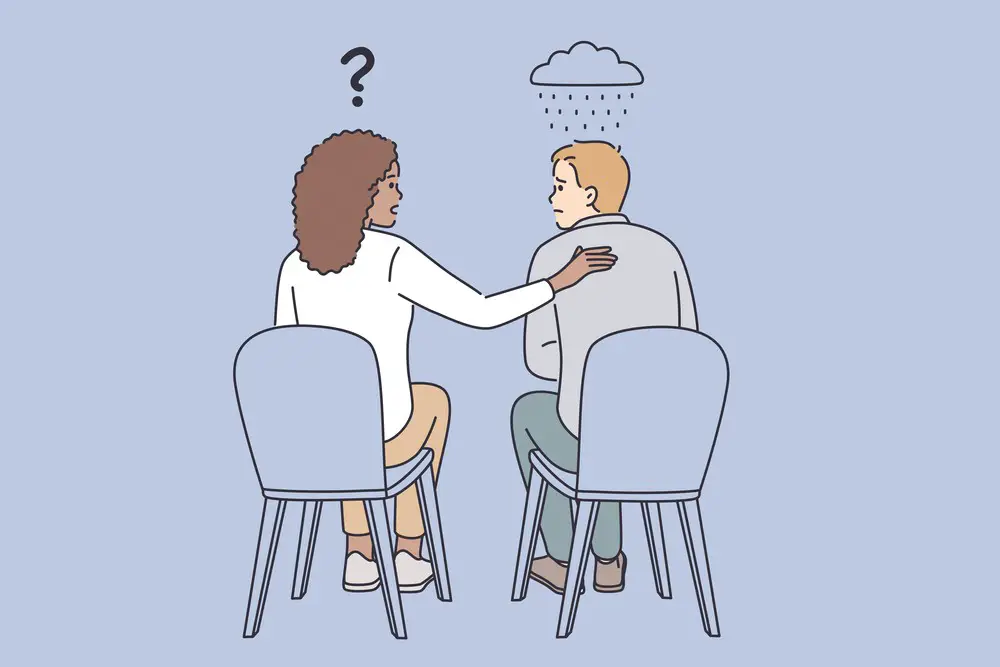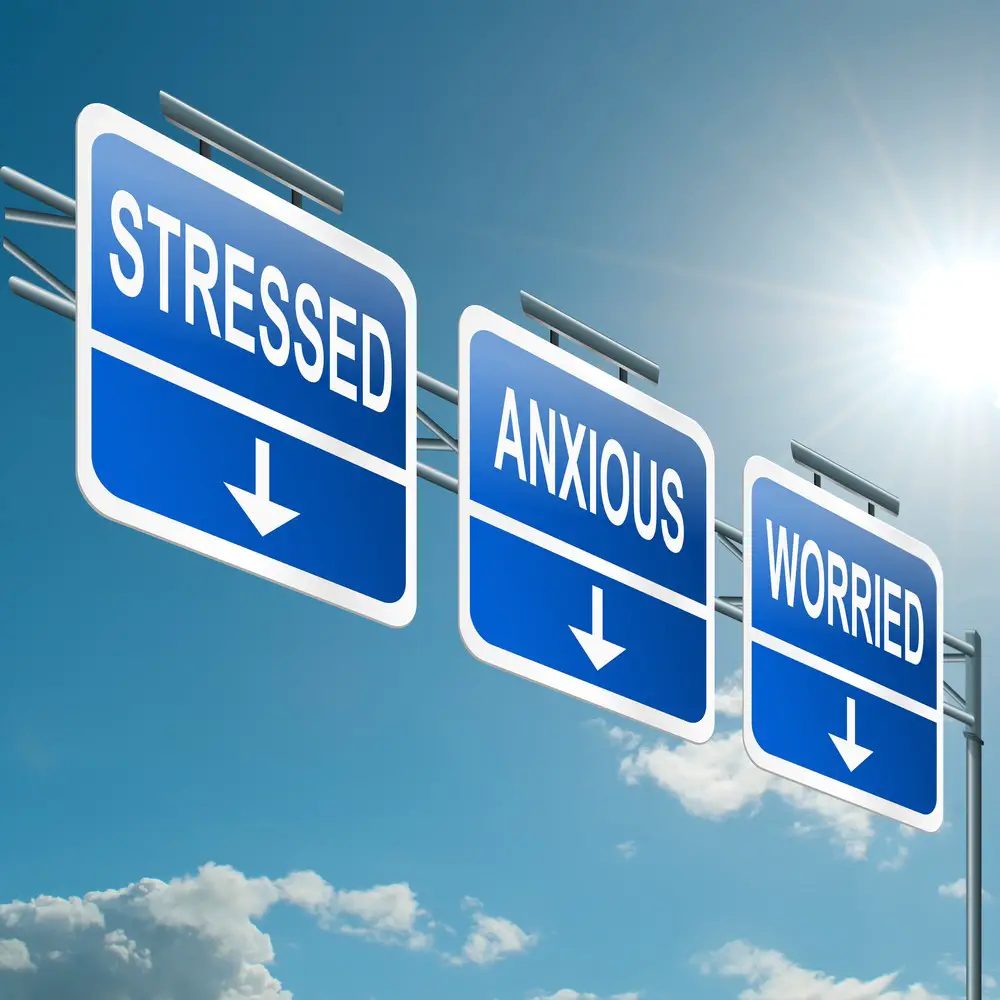Discussions around mental health are easier now than in the past, which is a significant step. However, just because we’re talking more about our mental well-being doesn’t mean that everyone understands the issues they and others are facing.
There are many facets of mental health, and the issue is complicated. While many of us know how we feel, we might not understand our symptoms or discuss them with others.
The recent pandemic has led to what many experts consider a decade’s worth of evolution is just two years, leaving many individuals facing spiraling mental health problems.
As a result, it’s now more critical than ever to talk clearly about our mental well-being and what we need to feel safe and calm.
One major issue hampering many mental health discussions is the lack of understanding of common mental illnesses and terms used to describe their symptoms.
After all, if people don’t know what they’re talking about and can’t clearly articulate what they need, it’s hard for them to get the support they need.
A common misconception that can lead to confusion when talking about mental health is the distinction between stress and anxiety.
The two terms can sometimes be used interchangeably among mental health experts. However, these two issues are entirely separate, and you must understand the difference between them if you want to open up a frank discussion about your mental health and that of the people you love.
If you’re eager to learn about the difference between anxiety and stress, the symptoms of each, and how you can manage them, then keep reading.
This article will discuss what separates anxiety and stress, give you the building blocks to understand your unique symptoms, and offer you practical ways to handle these issues and get you back to peak mental well-being.

Are Stress And Anxiety The Same?
Stress and anxiety are very different issues, but they can sometimes seem very similar. The main difference between stress and anxiety is that a specific issue causes stress.
Usually, stress can be alleviated when the issue is overcome or removed. However, anxiety is a prolonged feeling of stress, which doesn’t always directly cause.
Anxiety is often ongoing and can be the result of an anxiety disorder, while stress is the result of environmental or lifestyle factors.
As the two issues are very different, it is possible to have anxiety and stress simultaneously. You can feel anxious generally and simultaneously get triggered by stressors, thus becoming both stressed and anxious.
For example, a stressful situation, such as moving to a new home or breaking up with a significant other, could lead to stress. If you already have anxiety, this additional stress could exacerbate your symptoms.
Being stressed and anxious simultaneously can cause significant upheaval in your life and leave you struggling to do the things you enjoy the most.
Thankfully, there are ways you can deal with both your anxiety and stress and overcome the worst of the symptoms of both problems.
Below, we define stress and anxiety in more detail and explore how you can identify the two issues to understand your mental wellness and how you can deal with any problems you might face.

What Is Stress?
Stress is a feeling of overwhelm or fear. It can leave you unable to cope with life and cause mental and physical problems.
When we get stressed, the issue begins in the brain, when your eyes and ears send information about a challenging situation to the amygdala, which processes information.
The amygdala sends a distress signal to a part of the brain called the hypothalamus, which acts as a command unit.
The hypothalamus then sends signals to the adrenal glands, producing hormones and releasing adrenaline into your body.
The result is that your body and mind can feel overwhelmed, which can cause various issues, depending on the cause of the stress and the level of worry you feel.
Stress can manifest itself due to a range of factors. Some common causes of stress include:
- Pressure to hit targets at work or in life in general
- Significant life changes or upheaval such as moving to a new home or starting a new job
- The loss of a loved one
- Money troubles and financial difficulties
- Other health problems, viruses, and physical illnesses
- Not having enough work or change and being bored with your life
- Uncertainty in the social, economic, or political climate
- Negative and uncontrollable changes to your life, such as the loss of a job or a divorce
- Being bullied or harassed by someone else in your life
The causes of stress are personal and are often unique to your situation. As such, this list isn’t exhaustive, and you might not see the cause of your stress.
Also, you might not realize that a more significant issue causes stress. For example, if you get stressed by a minor issue, such as a broken shoelace or a small mess in your home, then you might not realize that the real problem is that you’re exhausted by your job.
When you notice that you’re experiencing stress, you should work to understand the root cause of the issue.
Often, stress is noticeable because you will experience a mental state different from the norm due to a specific challenge.
When your body reacts to stressful situations and the adrenaline releases, you can experience various physical and mental changes. Some of the common symptoms that you might notice when you’re stressed include:
- Feeling irritated or annoyed by a minor issue
- An inability to focus on even the simplest of tasks
- Grinding your teeth or cracking your knuckles
- Fiddling with small objects obsessively
- An ongoing feeling of dread and unease
- Feeling unnecessarily nervous and agitated
- Being unable to concentrate
- Unusual forgetfulness
- Loss of appetite or feeling suddenly very hungry or thirsty
- Feeling tired despite being well-rested
- Headaches and generally feeling weak in your body
- Shaking or aching muscles
- Becoming less friendly and not enjoying the hobbies you used to
- Significant changes in your personality for a short period
- Being unable to let go of small issues or presumed wrongs
- Fixating on a past event and replaying it over and over again in your head
- In extreme cases, physical violence and extreme anger
Often, these symptoms are short-term and will pass with some time or if you avoid or remove the cause of the stress.
If you notice that you’re experiencing ongoing stress or that the symptoms persist after the stressor is removed, you should consult your doctor.
They can check out your symptoms and make sure that they are not a sign of something else, such as an anxiety disorder, which we’ll discuss in more detail later in this article.
If a health problem causes your stress, your doctor can treat this issue and remove the source of your stress, leaving you feeling better physically and mentally.
Removing the cause of stress isn’t always easy or possible, but luckily, there are other ways to handle your stress.
Carry on reading, and we’ll explore some ways you can deal with ongoing stress and reduce its impact on your life.

How To Deal With Repeated Stress
As mentioned above, the best way to reduce and end stress is to identify and remove its cause. So, if you know that you’re stressed because of a family member being rude, you should either avoid them or speak to them to stop them from causing you stress.
Also, you can adapt your life around the leading causes of stress. So, if you are often stressed about money, you can work to save every month and set a strict budget, which could help you feel more secure about your financial situation.
If your stress is due to a health concern, make sure that you take your medicine and work with your doctor to improve your health and general wellness.
Sometimes, the cause of the stress cannot be removed or overcome. For example, if your stress is caused by worry about the economy, then there’s not anything you can personally do to fix this major issue.
If this is the case, then there are other ways to deal with the situation and work to overcome it. Some simple ways you can work to alleviate your stress when you can’t get rid of the cause include:
- Take regular breaks from watching the news or scrolling through social media so that you can avoid persistent negativity
- Work out what small annoyances you can avoid reducing your exposure to stress
- Try to distract yourself with a pleasurable activity that you know you enjoy, such as driving or cooking
- Do something soothing that’s not too strenuous, such as coloring or listening to calming music
- Use ear defenders and blindfolds to create a calm space for yourself to sit in for a while
- Take care of your physical needs, such as getting enough sleep, eating well, drinking plenty of water, and washing yourself
- Avoid or reduce your intake of stimulants such as drugs, alcohol, nicotine, sugar, and caffeine if you can
- Get help for any addictions or substance problems that you might be dealing with
- Talk to friends or family members about your worries
- Find an app with stress-relieving exercises or relaxing music
- Try deep breathing to recentre your mind and unwind
- Spend time having fun with your friends to distract yourself from your stress and worries
- Use stress-relieving tools such as stress balls
- Eat soothing gummies designed to reduce stress
- Drink a tea that can help to get rid of your stress and help you relax
- Find some simple stress-relieving activities
These tips should help you reduce stress, but everyone is different so that they won’t work for you. Instead, try out a few tactics to find the ones that suit you the best, and then use them when you’re stressed.
Stress can come anytime, but by being prepared and working to avoid known triggers, such as rude family members, you can reduce its impact on your mental well-being.
If you notice that your stress is persistent or doesn’t seem to have a cause, then there’s a chance that this could be anxiety.
You should always visit a doctor if you get repeated stress, but you can also learn about anxiety and work out if your stress could be anxiety.
Read on, and we’ll explain what anxiety is, how it differs from stress, and what you can do to identify and manage it.

What Is Anxiety?
Anxiety is a persistent feeling of unease characterized by unwarranted worries or fears. Anxiety can be semi-permanent and might pass, but in many cases, it can be a sign of an anxiety disorder, which needs ongoing management.
Many different types of anxiety disorders or mental health issues could cause anxiety. Some of these include:
- Generalized anxiety disorder
- Post-traumatic stress disorder (PTSD)
- Obsessive-compulsive disorder (OCD)
- Social Anxiety And Phobias
- Separation anxiety disorder
- Substance-induced anxiety
- Hyperactive thyroid disorder
In some cases, you could be dealing with a combination of these issues, so always talk to your doctor to get a diagnosis and understand your mental health needs.
Whatever the cause of your anxiety, you must understand it and work towards treating the issue. If you don’t, you could find that you experience severe symptoms and don’t know what to do.
Anxiety is caused by an imbalance of hormones in the body. These include the ‘happy hormone,’ serotonin, relaxation stabilizers called endorphins, and the thyroid hormone.
Too much, or too little, of any of these hormones can cause an imbalance which can lead you to face anxiety, which can manifest itself in many ways.
The symptoms of anxiety differ depending on the cause of the problem, but many are renowned by those who suffer from anxiety and are well-known by mental health experts.
Some of the common mental and physical symptoms of anxiety include:
- An overwhelming feeling of dread and fear
- Panic attacks
- Difficulty concentrating on any task for any amount of time
- An ongoing bad mood or feeling of irritability
- Dizziness and nausea
- Shaking, a raised temperature, and other fever-like symptoms
- An elevated heart rate
- Stomach problems and a feeling of churning
- Sweating and a dry mouth
- Muscle aches and excessive tension in the body
- Headaches
- An inability to sleep
- Changes in appetite
- A general lack of interest in life
Everyone who experiences anxiety endures a unique combination of symptoms, which might depend on the cause of the anxiety, any other mental health issues you might have, and your general state of health.
If you’re experiencing anxiety in any form, then, as already mentioned, you should visit your doctor to understand the cause of the issue and get some support.
They might give you some help dealing with specific symptoms and give you some techniques to allow you to reduce the impact that your anxiety has on your life.
Below are some tips on managing your anxiety so that you can go about your daily life without letting it affect you too significantly.

How To Deal With Anxiety
As mentioned above, the first step you need to take when you’re concerned that you have anxiety is to visit your doctor.
They will talk to you about your symptoms and diagnose any disorder you might have. For example, if you experience specific symptoms resulting from your anxiety, such as stomach troubles or headaches, your doctor can check that these result from anxiety.
In some cases, these symptoms could indicate a different condition, so your doctor can review your health and treat any other problems you might be experiencing.
Then, they can help you understand your anxiety and work with you to find the best way to handle it. While there is no definite cure for anxiety, there are many ways to deal with it in the long and the short terms.
Your doctor can also refer you to mental health specialists who can give you targeted support. There are many ways you can deal with anxiety in the long term that your doctor can facilitate, including:
- Asking your doctor for advice and support
- Talking to a counsellor and having one-to-one therapy
- Attending group sessions
- Getting a prescription for an anti-anxiety medicine
Getting professional support can ensure that you deal with your anxiety proactively. Your therapist or doctor can help you manage your symptoms and understand why you get them.
While professional assistance is essential, you also need to learn everyday techniques to deal with anxiety attacks and manage your symptoms.
Your doctor or therapist can give you some ideas on how you can manage your anxiety, but there are also some tried-and-tested techniques that you can employ.
These techniques can help you overcome the day-to-day issues that anxiety can cause and improve your mental well-being generally.
These easy methods can be done at home and, while they aren’t guaranteed to succeed, they can make a significant difference to your mental state and reduce your anxiety. These include:
- Light exercise, taken regularly, can improve your mental well-being
- Avoiding stimulants such as alcohol, caffeine, and cigarettes where possible
- Improve your diet and reduce your intake of sugar and heavily processed foods
- Drink more water to ensure you’re always hydrated
- If you need it, get help for any substance addictions you are experiencing
- Try to improve your sleep routine and get as much rest as you can
- Use a deep breathing technique to alleviate your anxiety
- Meditate regularly to reduce the symptoms of your anxiety
- Take a relaxing bath and use soothing essential oils
- Practice mindfulness
- Explore techniques such as journaling and gratitude
- Avoid stressors or triggers that can cause anxiety
- Generally, work to boost your overall mental and physical health
These techniques can help you improve your mood and reduce your anxiety symptoms, but they need to be used in conjunction with professional support.
As such, while these techniques can be used at home, you should also talk to your doctor and visit a therapist to get the help you need.
These home remedies for the short-term symptoms of anxiety might not work for everyone, so try out a selection of them to find the best ones for you.
Then, when you’re dealing with an anxiety attack or are having a challenging day and experiencing stress on top of your anxiety, you can use these tactics to alleviate your symptoms and allow you to get yourself into a better mental state.
Navigating the Warning Signs: When It’s Time to Seek Professional Support
Turning to Alcohol as a Coping Mechanism: It’s crucial to recognize when occasional drinking crosses into dependency. If you find yourself increasingly relying on alcohol to deal with stress and anxiety, this could be a pivotal sign that you might benefit from professional guidance, including considering rehab for alcoholism.
Chronic Physical Symptoms That Won’t Subside: Stress and anxiety aren’t just mental states; they often manifest physically. Persistent symptoms like headaches, muscle tension, or stomach issues should be taken seriously, as they can be indicators that it’s time to consult a healthcare provider.
Daily Life Becoming a Struggle: Pay attention if anxiety and stress interfere with your work, relationships, or daily routines. Difficulty in managing everyday tasks or maintaining social connections signals a need for professional help.
Emotional Overwhelm: Feeling constantly on edge, irritable, or experiencing mood swings can indicate underlying issues. These emotional experiences are significant red flags, suggesting that seeking support is wise.
Sleep Patterns Disrupted: Both excessive sleep and insomnia can be signs of deeper problems related to stress and anxiety. Consistent sleep disturbances are often a clear call to action for seeking professional advice.
How to Reach Out for Help: If you’re experiencing these signs, consider speaking with your primary care physician or a mental health professional. They can offer guidance and, if necessary, refer you to specialized services, including rehab programs for alcoholism, therapy sessions, or support groups.
 Setting Goals and Recognizing Progress in Therapy
Setting Goals and Recognizing Progress in Therapy
Establishing Clear Objectives: The first step in any therapeutic journey is to set clear, achievable goals. These might include managing stress more effectively, reducing anxiety levels, improving coping strategies, or addressing specific issues related to alcohol use. It’s vital for these goals to be measurable and realistic, allowing for tangible tracking of progress.
Developing Healthy Coping Mechanisms: A key goal in therapy is to replace unhelpful coping strategies, like excessive drinking, with healthier alternatives. This could involve learning relaxation techniques, mindfulness, or new hobbies and activities that provide relief and fulfillment.
Improving Relationships: Therapy often aims to enhance interpersonal skills, helping individuals communicate better, understand their emotional needs, and establish healthier relationships with others.
Enhancing Self-Awareness and Emotional Intelligence: An essential aspect of therapy is gaining a deeper understanding of oneself. This includes recognizing triggers for anxiety and stress, understanding emotional responses, and developing greater emotional intelligence.
Recognizing Small Victories: Progress in therapy isn’t always linear or easily noticeable. It’s vital to acknowledge and celebrate small victories along the way, such as successfully managing a stressful situation or a day without relying on alcohol.
Regularly Reviewing Goals with Your Therapist: Therapy is a collaborative process. Regularly discussing your goals with your therapist ensures that you’re on track and allows for adjustments as needed. This ongoing review helps recognize progress and refocus on new objectives as previous ones are met.
Understanding That Progress Is Personal: Everyone’s journey in therapy is unique. Comparing your progress to others’ experiences can be misleading. What matters most is your growth and the positive changes you observe.
Summary
Due to the many challenges facing us in today’s fast-paced world, it’s understandable that many will experience stress at some point. However, learning to manage your stress and finding the right stress management products can help you deal with short-term stress and difficult situations.
Anxiety is also becoming more common, and as such, many of us might have to handle it or live with an anxiety disorder. Dealing with persistent anxiety and ongoing mental anguish often requires professional support and ongoing management, so speak to your doctor if you feel that you are experiencing anxiety. They can recommend counseling, medicines and other solutions to help you to reduce the impact that your anxiety has on your life.
The same goes for significant stress: your doctor can help you deal with your symptoms and check that they are not signs of something more serious. You can then enjoy the pursuits and hobbies you want and generally live your best life.
- The Burnout Epidemic: Why We’re All Feeling Overwhelmed and How to Cope - February 9, 2024
- How to Live a Peaceful Life - February 9, 2024
- Useful Information You Should Know About Health Screenings - February 8, 2024
This site contains affiliate links to products. We will receive a commission for purchases made through these links.



 Setting Goals and Recognizing Progress in Therapy
Setting Goals and Recognizing Progress in Therapy
